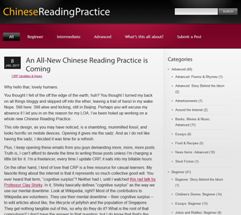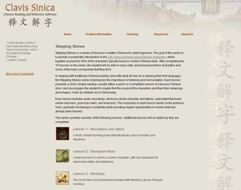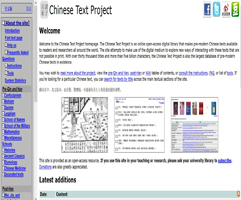lunedì 11 settembre 2017
venerdì 1 settembre 2017
mercoledì 30 agosto 2017
giovedì 24 agosto 2017
Membri della famiglia - Come si dice in cinese?
In Cina, i titoli per i familiari e per i parenti sono più complicati che nei paesi di lingua inglese.
In questo articolo, puoi imparare come chiamare i tuoi familiari o i tuoi parenti in cinese!
Ti capiterà di utilizzare solo alcuni di questi quotidianamente, ma questo è un elenco completo dei titoli che potrai incontrare durante l'apprendimento della lingua cinese.
Famiglia vicina
爸爸(bà ba): papà; 父亲(fù qin)è il modo formale di dire 爸爸(bà ba).妈妈(mā ma): mamma; 母亲(mǔ qīn)è il modo formale di dire 妈妈(mā ma).
爷爷(yé ye): il padre di tuo padre (tuo nonno paterno); 祖父 (zǔ fù)è il modo formale di dire 爷爷(yé ye).
奶奶 (nǎi nai): la mamma di tuo padre (la tua nonna paterna); 祖母(zǔ mǔ)è il modo formale di dire 奶奶(nǎi nai).
哥哥 (gē ge): fratello maggiore
弟弟 (dì di): fratello minore
姐姐 (jiě jie): sorella maggiore
妹妹 (mèi mei): sorella minore
Nonni e bisnonni
姥爷 (lǎo ye): il padre di tua madre (tuo nonno materno); 外祖父(wài zǔ fù)è il modo formale di dire 姥爷(lǎo ye).姥姥 (lǎo lao): la madre di tua madre (tua nonna materna); 外祖母(wài zǔ mǔ)è il modo formale di dire 姥姥(lǎo lao).
太爷 (tài yé): il padre di tuo nonno paterno (tuo bisnonno paterno)
太太(tài tai): la madre di tuo nonno paterno (tua bisnonna paterna)
太姥爷(tài lǎo ye): il padre di tuo nonno materno (tuo bisnonno paterno)
太姥姥(tài lǎo lao): la madre di tuo nonno materno (tua bisnonna materna)
Familiari dei nonni paterni
姑奶奶 (gū nǎi nai): la sorella di tuo nonno paterno姑爷 (gū yé): il marito della sorella di tuo nonno paterno
大爷 (dà yé): il fratello maggiore di tuo nonno paterno
大奶奶(dà nǎi nai): the wife of the oldest brother of your paternal grandfather dad’s.
If he is the second oldest, he is called 二爷 (èr yé), and his wife is called 二奶奶(èr nǎi nai), and so forth.
姨奶奶(yí nǎi nai): la sorella di tua nonna materna
姨爷 (yí yé): il marito della sorella di tuo nonno paterno
舅爷 (jiù yé): il fratello di tua nonna paterna
舅奶奶 (jiù nǎi nai): la moglie del fratello di tua nonna paterna
Familiari dei nonni materni
姑姥姥 (gū lǎo lao): the sister of your maternal grandfather姨姥姥 (yí lǎo lao):the sister of your maternal grandmother
姨姥爷 (yí lǎo ye): the husband of the sister of your maternal grandmother
舅姥爷(jiù lǎo ye):the brother of your maternal grandmother
舅姥姥 (jiù lǎo lao): the wife of the brother of your maternal grandmother
Your Father’s Side
伯伯(bó bo)or 大爷(dà ye): the older brother of your dad伯母(bó mǔ) or 大娘(dà niáng):the wife of the older brother of your dad
叔叔 (shū shū): the younger brother of your dad
婶婶(shěn shen):the wife of the younger brother of your dad
姑姑(gū gu): the sister of your dad
姑父(gū fu):the husband of the sister of your dad
Your Mother’s Side:
舅舅 (jiù jiu):the brother of your mum舅妈(jiù mā): the wife of the brother of your mum
姨 (yí):the sister of your mum
姨父(yí fu):the husband of the sister of your mum
表妹夫(biǎo mèi fu): the husband of the daughter of the sister (or brother) of your mum or of the sister of your dad, if the daughter is younger than you
表姐夫(biǎo jiě fu):the husband of the daughter of the sister (or brother) of your mum or of the sister of your dad, if the daughter is older than you
Cousins
堂兄(táng xiōng):the son of the brother of your dad, who is older than you堂弟(táng dì):the son of the brother of your dad, who is younger than you
堂姐(táng jiě):the daughter of the brother of your dad, who is older than you
堂妹(táng mèi):the daughter of the brother of your dad, who is younger than you
表哥(biǎo gē):the son of the sister of your dad, or the son of the brother (or sister) of your mum, who is older than you
表弟(biǎo dì):the son of the sister of your dad, or the son of the brother (or sister) of your mum,who is younger than you
表姐(biǎo jiě):the daughter of the sister of your dad, or the daughter of the brother (or sister) of your mum, who is older than you
表妹 (biǎo mèi):the daughter of ther sister of your dad, or the the daughter of the brother (or sister) of your mum, who is younger than you
表嫂(biǎo sǎo):the wife of the son of the sister of your dad or the wife of the brother (or sister) of your mum
In-laws
嫂子(sǎo zi):the wife of your older brother弟妹 (dì mèi): the wife of your younger brother
姐夫(jiě fu):the husband of your older sister
妹夫(mèi fu): the husband of your younger sister
Nephews and Nieces
侄子(zhí zǐ):the son of your brother侄女(zhí nǚ):the daughter of your brother
外甥(wài shēng):the son of your sister
外甥女(wài sheng nǚ):the dughter of your sister
Your Husband's Family
公公 (gōng gong): the father of your husband婆婆(pó po): the mother of your husband
大伯子(dà bǎi zi):the elder brother of your husband
大伯嫂(dà bǎi sǎo):the wife of the elder brother of your husband
小叔子(xiǎo shū zi):the younger brother of your husband
小婶子(xiǎo shěn zi):the wife of the younger brother of your husband
大姑子(dà gū zi):the husband of your elder sister
小姑子(xiǎo gū zi):the husband of your younger sister
Your Wife's Family
岳父(yuè fù)or 丈人(zhàng rén):the father of your wife岳母(yuè mǔ)or 丈母娘(zhàng mu niáng):the mother of your wife
大舅子(dà jiù zi):the elder brother of your wife
大舅嫂(dà jiù sǎo)or 大妗子(dà jìn zi) :the wife of the elder brother of your wife
小舅子(xiǎo jiù zi): the wife of your younger brother
小妗子(xiǎo jìn zi) :the wife of the younger brother of your wife
大姨子(dà yí zi):the elder sister of your wife
小姨子(xiǎo yí zi):the younger sister of your wife
You may want to bookmark this page or come back when you come across a “family title” you do not know. Just remember: knowing the exact meaning of the different ways to call family members and relatives will put you one step closer to reading and speaking Chinese like a native!
sabato 22 luglio 2017
mercoledì 28 giugno 2017
mercoledì 21 giugno 2017
martedì 13 giugno 2017
venerdì 2 giugno 2017
mercoledì 31 maggio 2017
Complimentarsi e ringraziare in cinese

It will only take 9 minutes to read this post!
If you don’t have time to study now, don’t worry! You can download The Right Way to Compliment and Show Thanks in Chinese PDF and read it later!
It’s that time of year again when we show goodwill to all men, so it seemed only right to take some time and learn some words and phrases that show gratitude, appreciation and giving compliments. Praise and showing appreciation in Chinese culture is very different to how things are done in the west, and modesty and humility are held in high regard. Knowing how to show thanks in Chinese demonstrates your understanding, appreciation and respect for Chinese culture, even if China is beginning to accept more western ways.
Complimentary Phrases
Level: Beginners
Use one of the following adverbs + adjective to create a complimentary phrase:真…! (zhēn…) …really..!
好…! (hǎo…) ….very/so..!
很…! (hěn…) …quite/very..!
How to Compliment Appearances
The following phrases are made using an adverb such as the ones above with an adjective related to appearance. Some commonly used adjectives for appearance are:漂亮 (piào liang) pretty
美 (měi) beautiful
帅 (shuài) handsome
酷 (kù) cool
可爱 (kě ài) cute/ adorable
年轻 (nián qīng) young
你好美!(nǐ hǎo měi) You are so pretty!
你的眼睛真好看!(nǐ de yǎn jing zhēn hǎo kàn) Your eyes are so beautiful!
你的鞋子很酷!(nǐ de xié zi hěn kù) Your shoes are so cool!
你的宝宝好可爱!(nǐ de bǎo bǎo hǎo kě ài) Your baby is so cute!
你看起来很年轻!(nǐ kàn qǐ lái hěn nián qīng) You look so young!
How to Compliment Behaviour and Character
To compliment a talent, skill or positive character trait that someone possesses, you can use the following phrases:好 (hǎo) good/well
厉害 (lì hai) serious (-ly good)
温柔 (wēn róu) gentle
有意思 (yǒu yì si) interesting/fun
有趣 (yǒu qù) interesting/fascinating
乖 (guāi) well-behaved
聪明 (cōng ming) smart/intelligent
棒 (bàng) great
你真好!(nǐ zhēn hǎo) You are so nice!
你游泳真厉害!(nǐ yóu yǒng zhēn lì hai) You are really good at swimming!!
真有趣!(zhēn yǒu qù) That’s funny!
你的厨艺真好!(nǐ de chú yì zhēn hǎo) You cook really well!
宝贝,你真棒!(bǎo bèi, nǐ zhēn bàng) Sweet heart, you’re so great!
Level: Advanced
Appearance:
你看起来像高中生!(nǐ kàn qǐ lái xiàng gāo zhōng shēng) You look like you could be a high school student.Behaviour and Character:
这是你做的菜?我想天天去你家吃饭。(zhè shì nǐ zuò de cài? Wǒ xiǎng tiān tiān qù nǐ jiā chī fàn) Did you cook this?! I want to eat at your home every day.
Receiving Compliments
In Chinese culture modesty is highly prized and if someone was to give you a compliment, you would never say ‘thank you’. In the west, saying ‘thanks’ is just a polite way to accept a compliment, whereas in Chinese culture, this would be egotistical. Although, it is fair to say that more and more Chinese people are accepting the more western way of receiving complimentsInstead of accepting a compliment, it is common to deflect the compliment or praise by using one of the following phrases:
哪里, 哪里。(nǎ li nǎ li) Where? Where? (No, I’m not…)
Although the literal translation of this phrase is ‘Where? Where?’, the actual meaning behind it is ‘cannot accept this compliment’. In fact, most of the phrases here can be used in a similar way to 哪里,哪里 (nǎ li nǎ li), but the following are more commonly used:
一般,一般。(yī bān, yī bān) Not good, not good (I’m just so-so)
还好,还好。 (hái hǎo, hái hǎo) Not bad, not bad. (I’m tolerable…)
不,不,不 (bù, bù, bù) No, no, no…
Here are some compliments you might give and receive in China, and some deflecting responses:
Compliment:
- 你的中文说得很好。(nǐ de zhōng wén shuō de hěn hǎo) You speak Chinese really well.
Reply:
- 哪里,哪里,我才刚开始学。(nǎ li nǎ li, wǒ cái gāng kāi shǐ xué) It’s not good, I just started to learn.
- 不,不,我说的不好。(bù, bù, wǒ shuō de bù hǎo)。No, no, I don’t speak well.
是吗 (真的吗)?(shì ma (zhēn de ma?)) … Really? …
Compliment:
- 你的耳环很漂亮。(nǐ de ěr huán hěn piào liang) Your earrings are very pretty.
Reply:
- 是吗?我昨天才买的。(shì ma? Wǒ zuó tiān cái mǎi de) Really? I just bought them yesterday.
- 真的吗?我也很喜欢。(zhēn de ma? Wǒ yě hěn xǐ huan) Really? I like them too.
- 真的吗?谢谢。(zhēn de ma? xiè xie) Really? Thanks.
还行吧。(hái xíng ba) Just so-so.
马马虎虎。(mǎ ma hū hū) Just so-so.
也就这样, …。(yě jiù zhè yàng…) It’s just as it is, …
Compliment:
- 你换发型了?看起来很帅!(nǐ huàn fà xíng le, kàn qǐ lái hěn shuài.) Have you changed your hairstyle? It looks great (handsome)!
Reply:
- 还行吧,你比我帅多了。(hái xíng ba, nǐ bǐ wǒ shuài duō le) It’s OK, but you are more handsome than me.
- 也就这样吧,我在家门口剪的。 (yě jiù zhè yàng ba, wǒ zài jiā mén kǒu jiǎn de) It’s just as it is, I had it cut near my home.
谢谢 (xiè xie), …
Compliment:
- 你做的菜真好吃。(nǐ zuò de cài zhēn hǎo chī) You cook really well.
Reply:
- 谢谢,好吃你就多吃点。(xiè xie, hǎo chī nǐ jiù duō chī diǎn) Thank you. If you like it, please eat more.
- 谢谢,我妈妈叫我做的。(xiè xie, wǒ mā ma jiào wǒ zuò de) Thank you! My mom taught me.
Showing Gratitude 道谢 (dào xiè)

Although it is not customary to accept compliments, it is very important to show gratitude if someone has gone out of their way to help you.
The following expressions of gratitude range from casually thanking friends, to showing gratitude to someone who has helped you in a significant way.
谢谢 (xiè xie) Thanks
谢谢你 (xiè xie nǐ) Thank you
(太) 辛苦你了 (tài xīn kǔ le) / 麻烦你了 (má fan nǐ le) I‘ve caused you trouble.
多亏你了 (duō kuī nǐ le) Thanks to you
非常感谢 (fēi cháng gǎn xiè) / 十分感谢 (shí fēn gǎn xiè) / 太感谢(…)了 (tài gǎn xiè … le) Extremely grateful
感激不尽 (gǎn jī bú jìn) / 万分感谢 (wàn fēn gǎn xiè) Can’t thank enough
One of the simplest ways to show gratitude is to say 谢谢 (xiè xie) ‘thank you’.
谢谢你帮我忙。(xiè xie nǐ bāng wǒ máng) Thank you for helping me.
To show ‘appreciation’ and ‘gratitude’ you can use 感谢 (gǎn xiè):
非常感谢您的意见。(fēi cháng gǎn xiè nín de yì jiàn) I really appreciate your opinions
To explain to someone that you want to ‘express thanks’, you can say 表示感谢 (biǎo shì gǎn xiè):
为了表示感谢,我准备了一份薄礼,请笑纳。(wèi le biǎo shì gǎn xiè, wǒ zhǔn bèi le yī fèn bó lǐ, qǐng xiào nà) Please accept my gift as thanks. (Literal: To express my thanks, I prepared a small gift. Please kindly accept it.)

You can also say thanks indirectly, without using a form of 谢谢 (xiè xiè):
太麻烦你了。(tài má fan nǐ le) I’ve caused you too much trouble.
太辛苦了。(tài xīn kǔ le) I’ve caused you too much trouble.
真不好意思。(zhēn bù hǎo yì si) I’m so embarrassed.
Responding to Gratitude
Unlike in English, there is no phrase that means ‘you’re welcome’, but deflect gratitude with the following:不谢。 (bú xiè) Don’t thank me.
不客气。(bú kè qi) Don’t be polite.
不用 (谢)。(bù yòng xiè) No need (for thanks).
哪里。(nǎ lǐ) It was nothing.
没事。(méi shì) It was nothing.
没什么。(méi shén me) It wasn’t anything.
If you know of other ways to show gratitude in Chinese, please share your ideas with us below!
If you’re interested in learning Chinese, you can check out our Written Chinese Dictionary!
domenica 28 maggio 2017
domenica 14 maggio 2017
"La campanella deve essere sciolta - 解领系领 jiě lǐng xì líng
"Il problema deve essere risolto da colui che lo ha causato"
mercoledì 10 maggio 2017
sabato 6 maggio 2017
Particelle grammaticali per contare oggetti
本 běn (per contare libri o oggetti simili)
家 jiā (per contare costruzioni, edifici)
件 jiàn (per contare vestiti solo per la parte superiore del corpo)
张 zhāng (per contare oggetti piatti e quadrati)
个 gè (per contare in generale persone, oggetti)
家 jiā (per contare costruzioni, edifici)
件 jiàn (per contare vestiti solo per la parte superiore del corpo)
张 zhāng (per contare oggetti piatti e quadrati)
个 gè (per contare in generale persone, oggetti)
venerdì 5 maggio 2017
giovedì 4 maggio 2017
mercoledì 26 aprile 2017
martedì 25 aprile 2017
Non fare mai qualcosa di stupido - 不要因为一时的心烦,
Non fare mai qualcosa di stupido solo perché sei temporaneamente arrabbiato.
domenica 9 aprile 2017
venerdì 7 aprile 2017
lunedì 3 aprile 2017
lunedì 27 marzo 2017
Migliorare la lettura - Risorse sul Web
Quando si impara una nuova lingua, uno degli aspetti fondamentali è riuscire a migliorare le capacità di lettura, in modo da ampliare il proprio vocabolario ed approfondire la conoscenza della lingua.
Livelli di comprensione richiesta dai testi
- Principiante (P)
- Intermedio (I)
- Avanzato (A)
Chinese Reading Practice (P/I/A)
Chinese Reading Practice mette a disposizione testi per migliorare le proprie capacità di lettura, partendo da un livello base (principiante) fino al livello avanzato.
Il materiale messo a disposizione è molto vario: racconti per bambini, barzellete, poesie, canzoni, saggi.
Una caratteristica interessante è il fatto che tutti i testi sono accompagnati dalla traduzione in inglese.
Clavis Sinica (P/I/A)
Clavis Sinica è il produttore del medesimo software per migliorare la lettura di testi in lingua cinese.
Nella sezione "Resources/Text & Audio Library" sotto la voce "Stepping Stones E-Textbook" vengono messi a disposizione dei brevi testi adatti per un livello base (principiante) insieme a diverse risorse utili per l'ascolto del testo, un glossario dei termini utilizzati e una traduzione integrale in inglese.
Invece sotto la voce "Chinese Text Sampler" della medesima sezione, si trovano dei testi per un livello intermedio e avanzato, tratti dalla letteratura cinese classica e moderna, nonché testi tratti da film, canzoni, racconti, storia e politica.
Questo sito pubblica brevi articoli scritti da intelletuali e blogger cinesi su temi d'attualità di carattere sociale.
Anche se brevi sono testi complessi adatti ad un pubblico con conoscenza avanzata della lingua cinese.
E' anche una piattaforma di traduzione condivisa aperta a chiunque abbia una preparazione adatta per tradurre questo tipo di testi.
Chinese Text Project (A)
Chinese Text Project è una biblioteca digitale ad accesso libero, che mette a disposizione testi antichi cinesi (in particolare delle dinastie Qin e Han), in svariati campi quali la filosofia, la storia, la medicina cinese e altri.
Per avere una spiegazione dettagliata sui contenuti visitare la pagina "Introduction".
New York Times (Chinese Edition) (A)
Il New York Times in versione cinese.
Tutti gli articoli vengono messi a disposizione in lingua cinese (cliccando sulla voce 中文 subito sopra l'articolo) in lingua inglese (voce 英文) e in versione inglese/cinese affiancate (voce 中英对照).
Etichette:
audiotesti,
avanzati,
intermedi,
lettura,
libri,
principianti,
testi
venerdì 10 marzo 2017
martedì 7 marzo 2017
lunedì 6 marzo 2017
sabato 4 marzo 2017
martedì 28 febbraio 2017
sabato 25 febbraio 2017
Frasi cinesi - 中文词组 (zhōng wén cí zǔ)
mercoledì 15 febbraio 2017
Caratteri cinesi - Anche (也 yě)
Grado 29 - 也 (yě) anche / troppo | Tradizionale: 也
Guarda la sequenza dei tratti, ascolta l'audio e leggi le frasi di esempio per il carattere 也 (yě) all'indirizzo: http://bit.ly/2k35dJJ
也 (yě) si trova nelle seguenti parole:
也不 (yě bù) - né / né
也许 (yě xǔ) - forse / forse
也许 我 可以 帮 到 你. Forse ti posso aiutare?
Che frase puoi fare utilizzando il carattere 也 (yě)?
Puoi studiare questa scheda insieme alle schede dei caratteri comuni del dizionario "written chinese" all'indirizzo : http://bit.ly/1xrbzmJ
Guarda la sequenza dei tratti, ascolta l'audio e leggi le frasi di esempio per il carattere 也 (yě) all'indirizzo: http://bit.ly/2k35dJJ
也 (yě) si trova nelle seguenti parole:
也不 (yě bù) - né / né
也许 (yě xǔ) - forse / forse
也许 我 可以 帮 到 你. Forse ti posso aiutare?
Che frase puoi fare utilizzando il carattere 也 (yě)?
Puoi studiare questa scheda insieme alle schede dei caratteri comuni del dizionario "written chinese" all'indirizzo : http://bit.ly/1xrbzmJ
martedì 14 febbraio 2017
Frasi cinesi - Ti amo (我爱你 wǒ ài nǐ)
Questo giorno di San Valentino, vi insegniamo tre parole essenziali: "Io amo Chineasy".... scherzavo!
In questo link https://itun.es/i67V9SZ Jesse Edbrooke della band Transition vi insegna a dire "ti amo" in cinese. E' servito come ispirazione per l'ultimo singolo della band: "wǒ ài nǐ!"
lunedì 13 febbraio 2017
domenica 12 febbraio 2017
Frasi idiomatiche cinesi (中文成语 zhōng wén chéng yǔ) - 骑驴找驴 (qí lǘ zhǎo lǘ)
La frase idiomatica 骑驴找驴 (qí lǘ zhǎo lǘ) si può tradurre con "cercare l'asinello mentre ci si è seduti sopra".
Da un punto di vista personale rappresenta l'incapacità di vedere le proprie virtù e talenti pur avendoli sotto gli occhi.
Una storia divertente che mette in luce un problema che non capita davvero soltanto agli abitanti della terra di mezzo (traduzione letterale della parola "Cina" in cinese, 中国)...
Buona lettura con questa nuova storia che potremmo intitolare... "Cercando l'asinello"
有个人赶着五头驴去集市上卖,自己骑了其中的一头。快到集市了,他数了数驴子,发觉只有四头。
他心里一惊:明明赶的是五头,怎么少了一头呢?莫不是自己粗心大意,弄丢了一头?
他越想越懊悔,便从驴背上跳下来,在树下大哭起来。哭过之后,他抬起头来一看,咦!真怪!怎么又变回五头了呢?
原来,他自己骑的那头驴先前没有数!
现在,“骑驴找驴” 被用来比喻东西在身边却到处寻找。
Un giorno un uomo stava portando i suoi cinque asinelli al mercato della contea per venderli, egli cavalcava proprio uno di questi animali. Era ormai quasi arrivato in città quando si mise a contare i suoi asinelli, così si rese conto che ne mancava uno.
Il suo cuore sobbalzò: Indubbiamente ne aveva portati cinque con se, come poteva mancarne uno? Era mai possibile che fosse stato tanto negligente da perderne uno per la strada?
Egli più pensava e più provava rimorso per quella perdita, così scese dall'asinello che stava cavalcando, se ne andò sotto un albero e cominciò a piangere a dirotto. Quando ebbe finito di piangere, alzò lo sguardo, eh! Che strano! Come è possibile che gli asinelli fossero tornati ad essere cinque?
Originariamente, era il cammello che stava cavalcando che egli non aveva contato!
Oggi, "Qí lǘ zhǎo lǘ" è usato per indicare quelle cose che stanno accanto a noi ma che cerchiamo dovunque.
Concludo questa storia dicendo che questo chengyu non è usato nella lingua parlata al suo posto si trova questo chengyu 骑驴找马 che potremmo tradurre come cavalcando un cammello cercare il cavallo, in questo caso il senso di questo chengyu comprende anche il senso del precedente ma ha un senso più vasto ed è indicato prevalentemente per indicare una persona che vorrebbe sostituire una cosa per un'altra, sia in senso commentativo che dispregiativo.
Da un punto di vista personale rappresenta l'incapacità di vedere le proprie virtù e talenti pur avendoli sotto gli occhi.
Una storia divertente che mette in luce un problema che non capita davvero soltanto agli abitanti della terra di mezzo (traduzione letterale della parola "Cina" in cinese, 中国)...
Buona lettura con questa nuova storia che potremmo intitolare... "Cercando l'asinello"
有个人赶着五头驴去集市上卖,自己骑了其中的一头。快到集市了,他数了数驴子,发觉只有四头。
他心里一惊:明明赶的是五头,怎么少了一头呢?莫不是自己粗心大意,弄丢了一头?
他越想越懊悔,便从驴背上跳下来,在树下大哭起来。哭过之后,他抬起头来一看,咦!真怪!怎么又变回五头了呢?
原来,他自己骑的那头驴先前没有数!
现在,“骑驴找驴” 被用来比喻东西在身边却到处寻找。
Un giorno un uomo stava portando i suoi cinque asinelli al mercato della contea per venderli, egli cavalcava proprio uno di questi animali. Era ormai quasi arrivato in città quando si mise a contare i suoi asinelli, così si rese conto che ne mancava uno.
Il suo cuore sobbalzò: Indubbiamente ne aveva portati cinque con se, come poteva mancarne uno? Era mai possibile che fosse stato tanto negligente da perderne uno per la strada?
Egli più pensava e più provava rimorso per quella perdita, così scese dall'asinello che stava cavalcando, se ne andò sotto un albero e cominciò a piangere a dirotto. Quando ebbe finito di piangere, alzò lo sguardo, eh! Che strano! Come è possibile che gli asinelli fossero tornati ad essere cinque?
Originariamente, era il cammello che stava cavalcando che egli non aveva contato!
Oggi, "Qí lǘ zhǎo lǘ" è usato per indicare quelle cose che stanno accanto a noi ma che cerchiamo dovunque.
Concludo questa storia dicendo che questo chengyu non è usato nella lingua parlata al suo posto si trova questo chengyu 骑驴找马 che potremmo tradurre come cavalcando un cammello cercare il cavallo, in questo caso il senso di questo chengyu comprende anche il senso del precedente ma ha un senso più vasto ed è indicato prevalentemente per indicare una persona che vorrebbe sostituire una cosa per un'altra, sia in senso commentativo che dispregiativo.
Iscriviti a:
Commenti (Atom)






